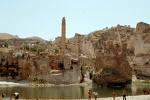 By Agence France Presse (AFP)
By Agence France Presse (AFP)
April 20, 2010
HASANKEYF- Turkey: Turkey has secured the support of a local bank to build a dam on a major historic site on the Tigris River, overriding harsh opposition at home and snubs by European lenders. The head of Turkey’s Akbank said last week that the company would help finance the construction, but not without a sense of discomfort for backing a project which, critics say, will displace 54,000 people and submerge millennia-old archaeological remains. Banks make only financial considerations when joining such projects. But the Ilisu dam will be the last such example for us? From now on we will pay attention also to environmental aspects; Suzan Sabanci Dincer told the Vatan newspaper.
Another major Turkish bank, Garanti, is also reportedly planning to extend financial support for the construction. At the core of opposition to the Ilisu dam is Hasankeyf, an impoverished town on the banks of the Tigris, once a mighty city in ancient Mesopotamia, which will be largely submerged by the dam’s giant reservoir.
Critics say the dam, to be completed with a 1,200-megawatt power plant, will destroy Hasankeyf’s unique historical remains and ruin the traditional lifestyle of its population of ethnic Kurds and Arabs. The local administration, and environmental groups, who have joined forces in a campaign to stop the project, gathered in Hasankeyf on April 11 for a conference to drum up support against the government. This project threatens 214 archaeological sites historian Adnan Cevik told AFP, pointing at the ruins of a 13th-century fortress on a hill overlooking the Tigris, dotted by hundreds of ancient cave houses. There are remains from prehistoric, Hellenic, Assyrian, Sassanid, Roman and pre-Ottoman times here, he said, as tourists climbed the hill to take respite in the tiny compounds carved into the rocks, which now serve as cafes.
Proponents say the dam, part of a broader plan to boost economic development in the poor, mainly Kurdish southeast, will create up to 10,000 jobs irrigate vast areas of farmland and provide vital energy for the economy. But Hasankeyf’s 4,000 residents, backed by civic groups, maintain they can prosper on revenues from tourism, pushing a petition campaign to have the town included on UNESCO’s list of world heritage and deter banks from financing the dam. We are here at the door of Mesopotamia. This place is an unbelievable combination of nature and culture, said Guven Eken, head of the environmental group Doga.
In July, Swiss, Austrian and German agencies withdrew a pledge for 1.2 billion Euros ($1.6 billion) worth of loan guarantees, saying Ankara had failed to answer concerns on how environment and cultural heritage would be protected. The lenders cited an independent study that the project did not meet World Bank criteria, prompting an angry response from Turkey, a candidate for EU membership, that the decision was political. Turkey has 172 hydroelectric plants, which meet 17 percent of its power demand, and 148 more are under construction, according to official figures.
Lawyer Murat Cano, part of a legal team which has petitioned the European Court of Human Rights to block the project, argued that Ankara’s environmental record was already poor, citing a number of dams built on the Euphrates, which also originates in Turkey. The Euphrates is already destroyed and now they are targeting the Tigris, he grumbled.
The activist argued that Prime Minister Recep Tayyip Erdogan was personally following the project and seeking financial help from Arab countries since the support of Akbank and Garanti will not be enough.?